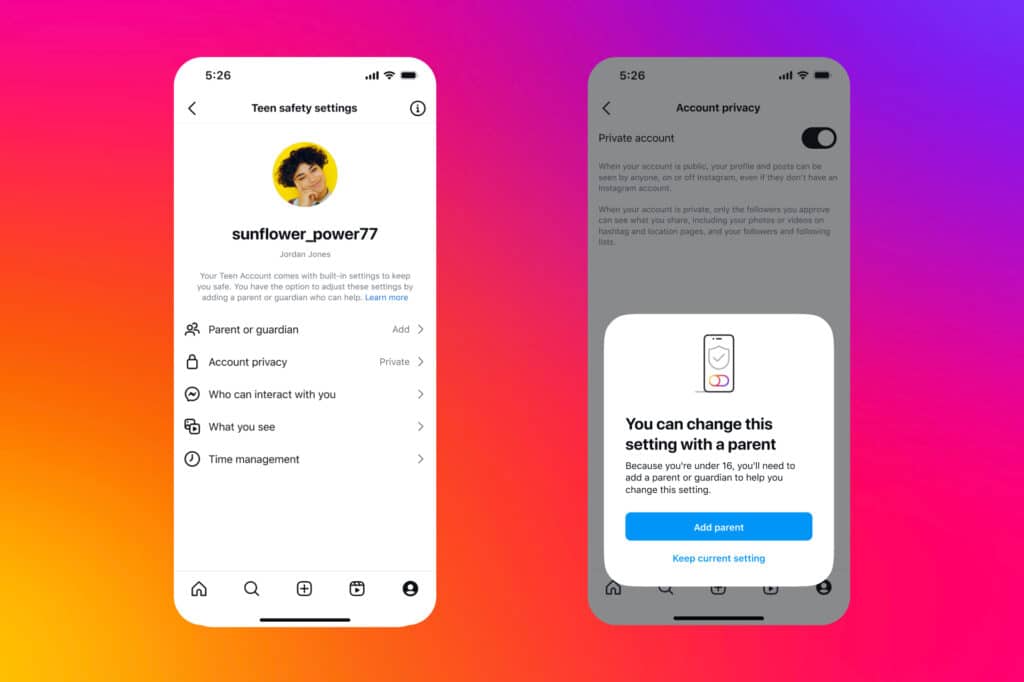Summary:
-
Teenagers on Instagram will soon have automatic privacy settings, with new “teen accounts” to enhance safety and control.
-
Meta’s move addresses concerns about child safety on social media, but critics argue more comprehensive measures are needed.
-
Despite efforts to improve, some critics find Meta’s new policies insufficient in addressing deeper issues of online safety.
Teenagers on Instagram will soon find themselves automatically placed into a new type of account designed to enhance privacy and give parents greater control. Meta, the parent company of Instagram, announced on Tuesday, September 17, that it will begin rolling out its “teen accounts” feature, which is set to transform how minors interact on the platform.
The new feature will make all accounts for users under 18 private by default. This means that teens will only be able to receive messages, tags, or mentions from people they already follow. This change represents Meta’s most significant effort to date to regulate how minors use Instagram and to address concerns related to child safety on its platforms.
Meta’s move comes in response to ongoing criticism about the safety of young users on social media. In January, Meta CEO Mark Zuckerberg faced scrutiny at a Senate hearing where he apologized to parents who said Instagram had contributed to their children’s suicides or exploitation. The company has since been working on various features to improve child safety, but these have often been inconsistently applied.

Naomi Gleit, Meta’s head of product, explained the rationale behind the new feature in an interview with NBC News. “Everyone under 18, including creators, will be put into teen accounts,” she said. “They can remain public if their parent is involved and gives them permission and is supervising the account. But these are pretty big changes that we need to get right.”
Gleit acknowledged that the company has received substantial feedback from parents about their desire for a simpler, more consistent set of controls. “One, it can be simpler and easier to use, and so that’s one of the goals of this launch,” she said. “Two, there’s some inconsistencies in the current settings that we do have. And then the third thing is really just wanting to have more control and tools to help their teen online.”
The rollout of the new teen accounts will not be immediate. New users under 18 will automatically be set up with teen accounts upon registration, but existing teenage users might not see these changes right away. Meta has indicated that the global rollout may take until next year to complete.
ADVERTISEMENT
In addition to the new privacy settings, teen accounts will feature the most restrictive content settings, limiting exposure to potentially sensitive content from accounts they do not follow. The accounts will also have the Hidden Words feature activated, which filters out offensive language from comments and direct messages.
Teens under the age of 16 will need parental or guardian approval to change the new account settings, while those 16 and older will have the autonomy to adjust settings themselves unless their accounts are still under parental supervision.
Meta anticipates that some teens might attempt to bypass these restrictions. To address this, the company is implementing measures to prevent age verification circumvention. For example, if a user creates a new account on the same device as their original account, they will be asked to verify their age using a government ID or a video selfie. Meta is also developing technology to detect potential age discrepancies and will ask users who might be teens to verify their ages.
The company plans to test these age prediction tools in the U.S. early next year. This technology, described as a first for the industry, will analyze behavioral signals such as account creation dates, content interactions, and writing styles to estimate users’ ages. Those flagged as potentially underage will be asked to verify their age and, if necessary, will be placed into teen accounts.
Meta is also introducing a “Sleep Mode” for teen accounts, which replaces the existing Quiet Mode and Night Nudges features. This mode will silence notifications and send autoreplies from 10 p.m. to 7 a.m. Additionally, users will receive prompts to limit their Instagram usage to 60 minutes a day, and parents will be able to set specific hours during which access to the app can be blocked or limit the daily usage time.
Despite these efforts, some critics argue that Meta’s new policies are insufficient. Social psychologist Jonathan Haidt expressed cautious optimism about the changes, calling them a positive step but noting that more comprehensive measures are needed. Conversely, nonprofit advocacy organization Accountable Tech criticized the update as a “PR exercise” that does not address the deeper issues related to online safety and privacy.
ADVERTISEMENT
Nicole Gill, co-founder and executive director of Accountable Tech, stated, “Today’s PR exercise falls short of the safety by design and accountability that young people and their parents deserve, and only meaningful policy action can guarantee.” She emphasized that Meta’s business model, which relies on user engagement and data mining, remains problematic despite the new controls.
As Meta implements these new features, the focus remains on balancing safety with user experience, particularly for younger audiences navigating the complexities of social media.









